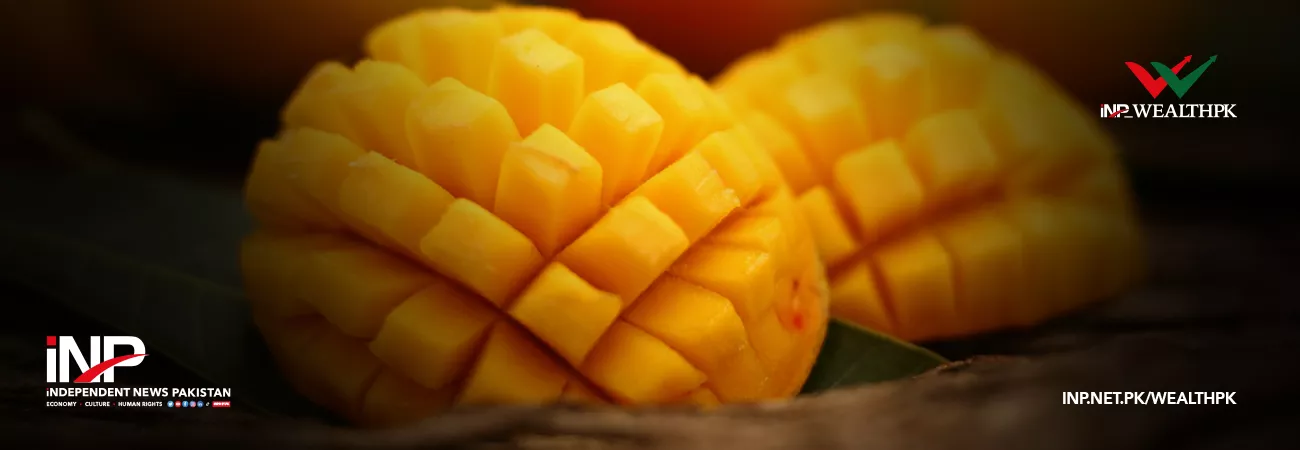INP-WealthPk
Arsalan Ali
Ensuring concessionary freight rates and exploring new markets can help increase Pakistan’s mango exports, experts stressed. They were speaking at a webinar organised by the Trade Development Authority of Pakistan (TDAP) recently. The experts shared their insights and experiences regarding the challenges and opportunities in mango exports. On the occasion, Waheed Ahmed, Patron-in-Chief of All Pakistan Fruits and Vegetable Exporters Association (APFVEA), said lack of research and development was a major challenge to Pakistan's mango export industry.
He pointed out exporters suffered significant losses at the time of offloading mango shipments. Waheed Ahmed, who is also a former vice-president of Federation of Pakistan Chamber of Commerce and Industry, also highlighted the impact of high cargo charges on mango exporters. “Compared to India, the cargo charges are much higher in Pakistan, which increases the cost of exports. Moreover, climate change is also affecting the production of mangoes in Pakistan.”
However, he remains optimistic about the future of Pakistan's mango industry. “Pakistan’s mango exports to China could reach 30,000 to 40,000 tonnes if a strategic plan is formulated for the next five years. This will require a sustained effort to promote research and development to address the concerns of Chinese buyers,” he added. Speaking at the webinar, Hussain Haider, Consul General of Pakistan in Shanghai, said an exhibition was held in Shanghai with the cooperation of TDAP in 2020 to help boost the export of mangoes to China. “Since the exhibition, Pakistan’s mango exports witnessed a 10% increase to China till 2021. However, the growth was offset in 2022 by a decline in the production of mangos in Pakistan.”
He stated that volume of exports in 2021 was not that significant, and that there remained untapped potential for further growth. According to Haider, two key factors that influence the export of mangoes are price and non-price factors. He highlighted that the cost of freight from Pakistan to China was significantly higher than Southeast Asian countries, making Pakistan less competitive.
Additionally, he said mangoes exported from Pakistan to China carried black spots, which are not favoured by Chinese buyers. To address these challenges, Haider emphasised the importance of promoting Pakistan's mangoes in China through sustained trade promotion activities. Additionally, he suggested standardised packing could help increase mango exports to China. Haider expressed his determination to overcome the challenges and boost mango exports to China, underscoring the potential for mutually beneficial trade relations between the two countries
Nauman Aslam, Consul General of Pakistan in Turkey, said Pakistan’s mango export industry had the potential to make significant inroads into the Turkish market. “This is due in part to the fact that the current duty structure on mango exports to Turkey stands at a zero rating of 45%, thus presenting a favourable opportunity for Pakistani mango exporters.” He highlighted that in order to fully leverage this potential, air freight services from PIA would play a crucial role in capturing the Turkish market.
He emphasised that Turkey was a price-sensitive market, and therefore, the affordability and efficiency of air freight services would be a key determinant in the success of Pakistani mango exports to Turkey. Mahmood Nawaz Shah, a leading mango producer from Tando Allahyar, Sindh, highlighted that India's freight rates were 15 to 17 times lower than Pakistan's, making Indian mango exports more competitive in the global market. Shah believes that the government must step in to address this viability gap of freight and ensure competitive freight rates for Pakistan's mango exports.
Credit: Independent News Pakistan-WealthPk




